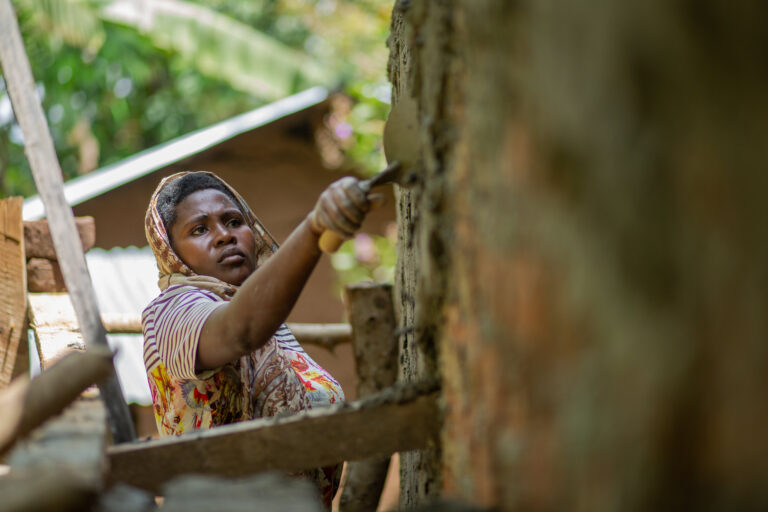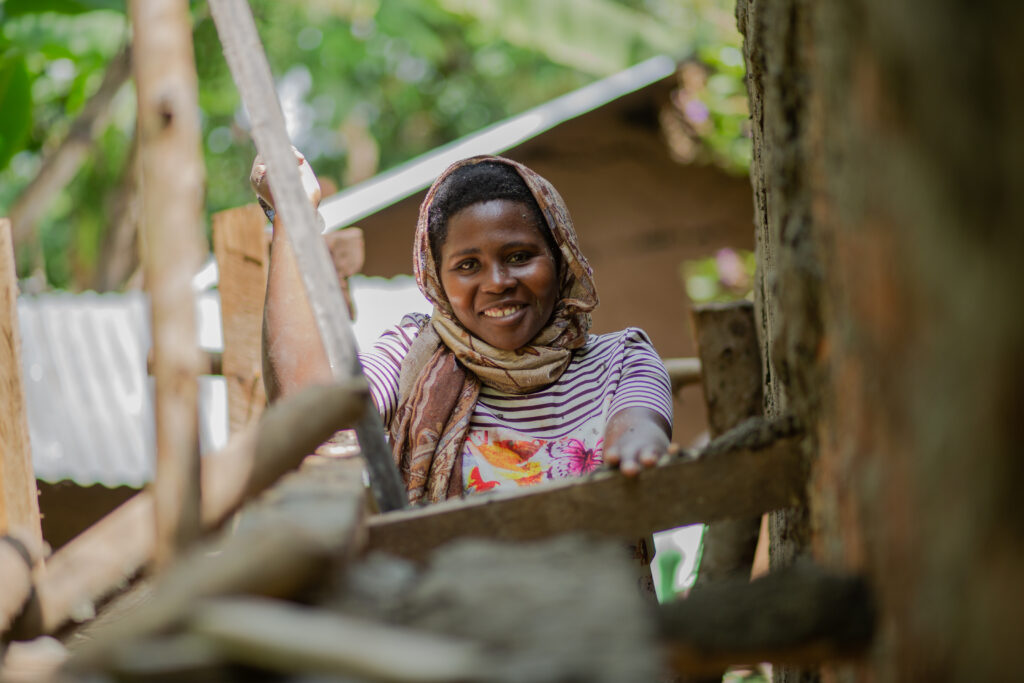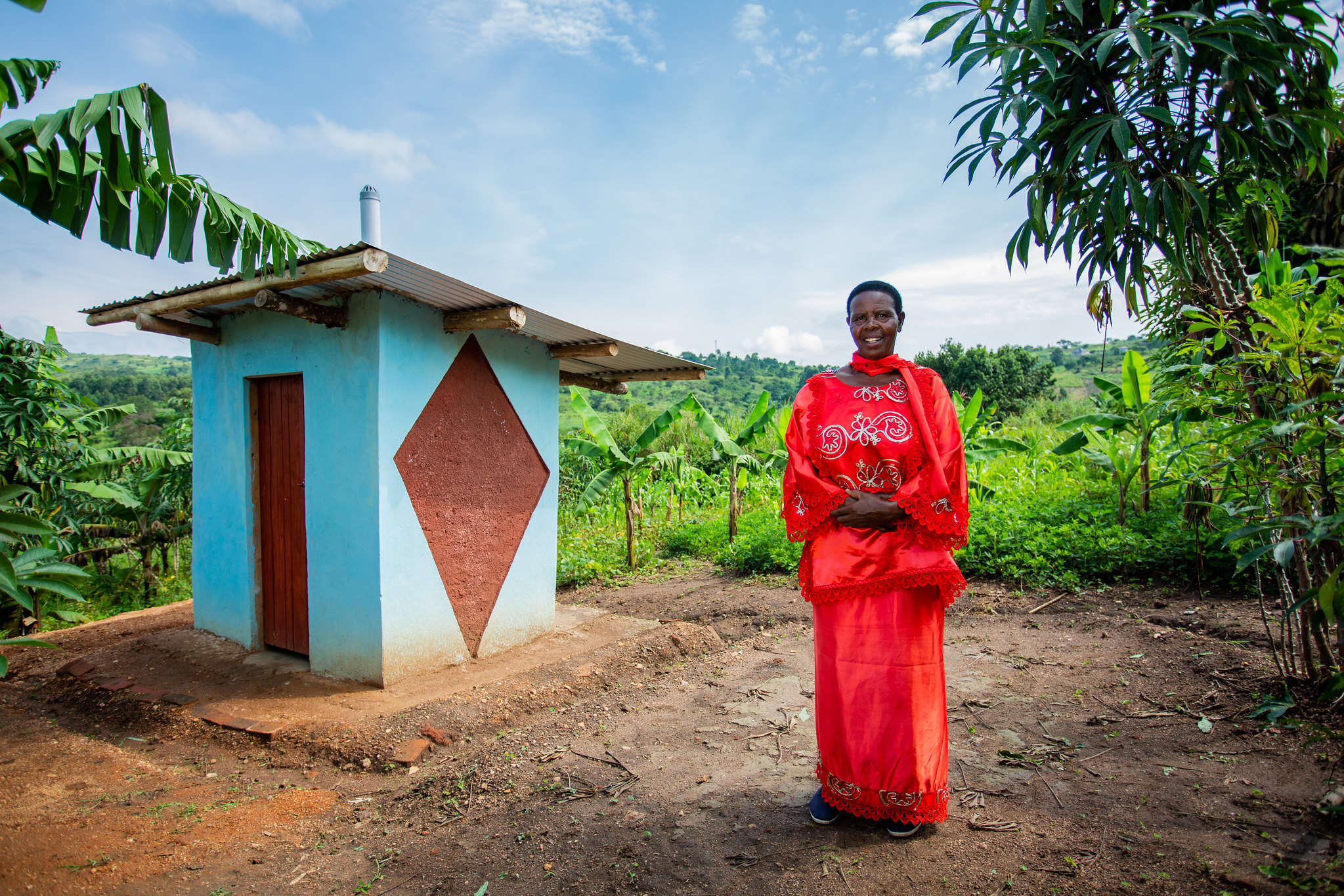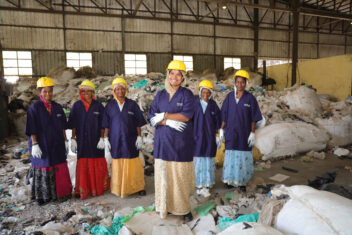Unlocking unlikely opportunities for women entrepreneurs in sanitation and waste management

Teaming up
Over 60% of toilets in rural areas have been found to be poorly constructed, do not meet the standards for basic sanitation services and cannot be emptied, hindering safe disposal, according to Uganda’s Kabarole District (Western Uganda, Rwenzori region) Water/sanitation/hygiene (WASH) Master Plan 2013-18. Furthermore, 4% of the population has no access to any sanitation facility and 81% of Kabarole’s population have traditional pit latrines. The FINISH Mondial Uganda programme, implemented by Caritas Fort Portal–HEWASA and Amref Health Africa, have taken this gap in sanitation and service delivery to transform local communities by improving sanitation standards.
Our programmes are not only promoting safely managed sanitation facilities and strengthening the entire sanitation value chain but unlocking unlikely opportunities for women in sanitation and waste management, especially in construction. The approach results in peopling being aware of the need for a safe and durable toilet, they want to buy one, can afford it, and local people can build them. Financial Inclusion Improves Sanitation & Health (FINISH) Mondial is one of WASTE’s programmes working on these issues in 6 countries throughout East Africa and South Asia contributing to healthier and socio-economically empowered communities, led by WASTE, Amref Flying Doctors and Aqua for All.

Nearly 4 decades of private sector development in sanitation and waste management
WASTE has been working on private sector development in sanitation and waste management for nearly 4 decades. This has resulted in a close partnership with the FINISH Mondial Uganda’s supply side partner, Caritas Fort Portal-HEWASA, for almost a decade. Caritas provides the onward technical training and business support to local WASH and waste management entrepreneurs. Business support can range from things like basic bookkeeping to facilitating access to finance through WASH loan portfolio development with local microfinance institutions (MFIs). The approach is tailored to each local context and needs in each project, geographic and country area needs.
Female masons can play a significant role in realising the dream of safely managed sanitation for households demanding it, with 45% of toilets constructed by female masons under the FINISH Mondial Uganda programme. A few key players have been leading as master artisans in the area. This has been as result of the strengthened supply chain which has created a ‘win-win’ situation. Appealing to both a young and female audience, the programme partners have demonstrated that there are opportunities in construction for women, breaking down common taboos about what the work of a mason requires. The programme is training local young women to gain skills in construction and form small groups to construct quality sanitation infrastructure (namely, toilets), boosting their own economic strength as well as realising improved sanitary facilities for their communities.
An ambassador for female inclusion in construction work
Tweheyo Naume, the 23-year old mason featured here, is an ambassador for this approach. She told us, “I want to thank the FINISH programme for involving us. They have trained us and now we have acquired skills in constructing different sanitation technologies. They have created job opportunities for us and now we are able to look after ourselves and help our families as well.” She elaborated on the impact of her work, “[In the past,] people in our communities were suffering from several diseases, like cholera and typhoid, but because of the improved sanitation situation, people no longer suffer from those diseases and their earnings have increased due to less spending on healthcare
Naume has constructed over 80 toilets so far in Western Uganda, contributing to the FINISH Mondial Uganda programme’s great achievement of constructing more than 18,000 toilets in 2021. Her dream is to become known in the region for her quality work and start up a female-only construction company as a way of empowering them and sticking together in a largely male-dominate field. She has started up additional side businesses from the funds she earns as a mason, such as a poultry project she runs together with her mother. Furthermore, Naume has trained over 40 more female masons through her work. They have acquired skills, a reputation for quality work and are now in high demand. This increases their household income and their standards of living.
The involvement of female masons in the programme is unique in this area, where construction has mainly been considered disproportionately men’s work. However, WASTE’s approach to entrepreneurial and business development is universal, identifying underserved parts of local systems to bridge gaps in sanitation and waste services. The FINISH Mondial Uganda team is leading the way to make the case for female inclusion in skilled construction work. The FINISH programme is also working on other gender inclusion issues, such as appealing to men to see opportunities in work that has been traditionally seen as women-dominated work, such as is the case with Community Health Workers (CHWs). CHWs are often seen in the programmes to be majority female, conducting the awareness raising and demand creation for safe sanitation, but it doesn’t have to be that way.
Gender empowerment must focus on opening opportunities for both male and female entrepreneurs
Our approach to strengthening the entire value chain of sanitation means increasing opportunities for local ownership of the process and sustainability of initiatives, regardless of gender.



